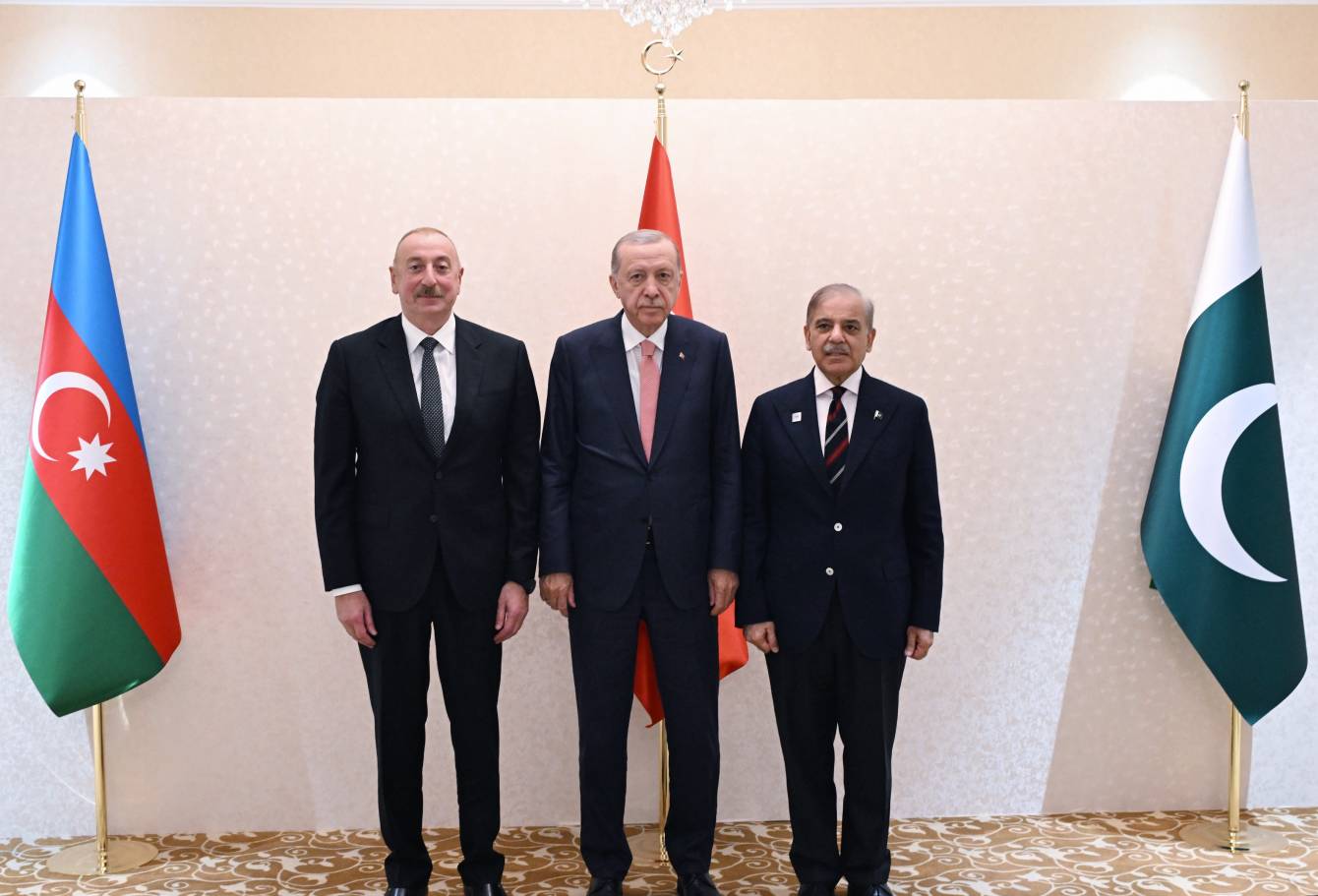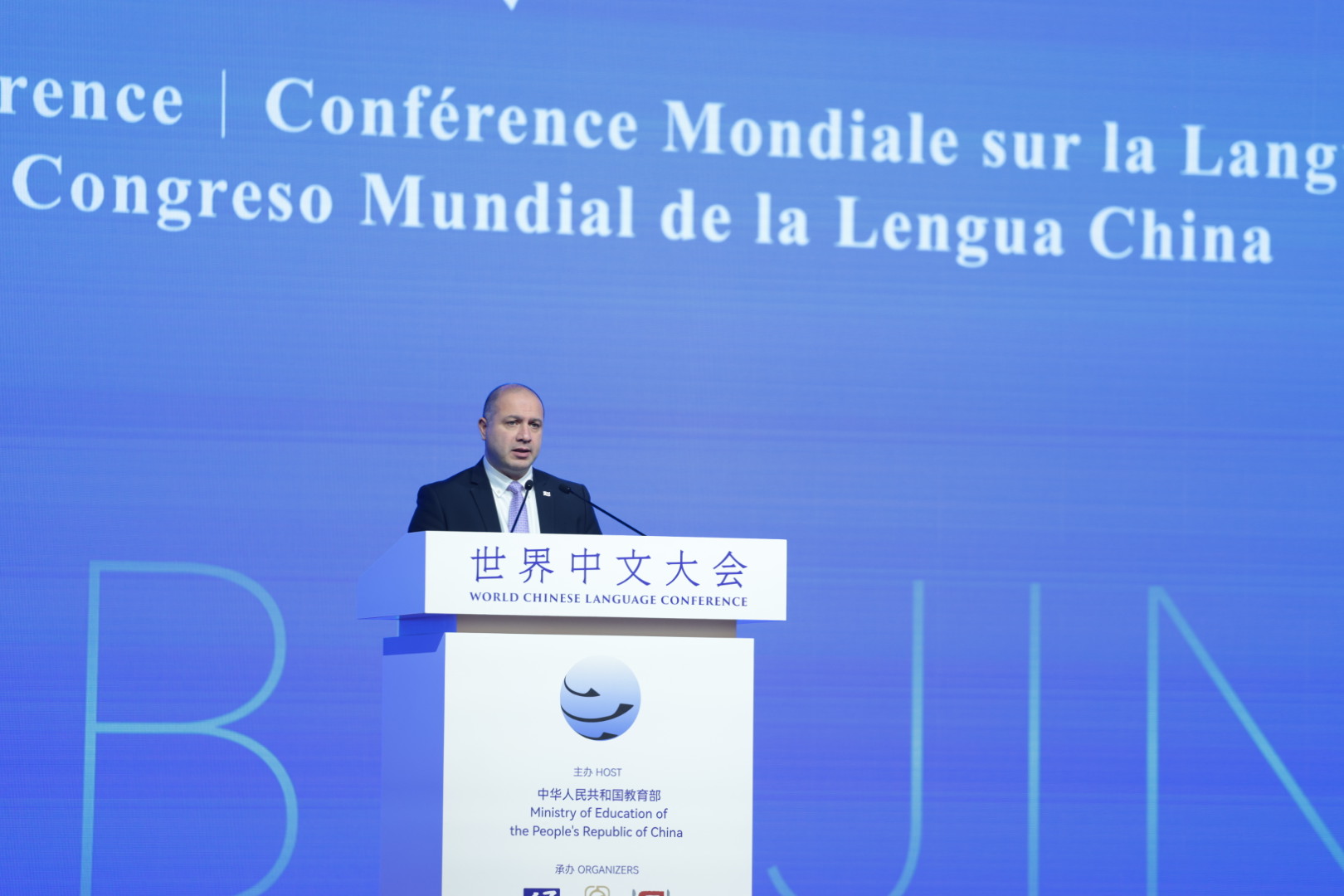
Azerbaijan Strengthens Trilateral Cooperation With Pakistan and Türkiye
Azerbaijan Strengthens Trilateral Cooperation With Pakistan and Türkiye
Executive Summary:
- Azerbaijani President Ilham Aliyev’s visit to Islamabad and the trilateral meeting of Azerbaijan, Pakistan, and Türkiye in early July highlight growing cooperation in various fields among the three countries in trying to gain more influence over regional trade and transit.
- Baku and Ankara have advanced relations to the point of close partners on defense, security, trade, investment, and energy matters. Azerbaijan and Pakistan have built mostly political ties but intend to bolster not only trade but military cooperation as well.
- Expanding the Azerbaijan–Pakistan–Türkiye trilateral is meant to strengthen Baku, Islamabad, and Ankara’s positions in the South Caucasus and serve as a counterweight to other regional players and the influence of outside powers.
On July 11 and 12, Azerbaijani President Ilham Aliyev paid a state visit to Pakistan to bolster bilateral ties with Islamabad. The visit came less than two weeks after Aliyev’s meeting with Pakistani Prime Minister Muhammad Shehbaz Sharif and Turkish President Recep Tayyip Erdogan for their first-ever trilateral summit. The meeting took place on the sidelines of the Shanghai Cooperation Organization summit on July 3 in Astana and was a significant milestone in elevating their tripartite cooperation from parliamentary and ministerial levels to state leadership (see EDM, August 16, 2021; President.az, July 3). Both Aliyev’s visit to Islamabad and the trilateral summit of Azerbaijan, Pakistan, and Türkiye highlight the three countries’ commitment to expanding their trilateral trade and transit cooperation, as well as better integrating their military capabilities and defense production.
The three countries have consistently supported each other on critical issues. For Baku, Islamabad and Ankara have supported efforts to liberate formerly occupied territories and the subsequent peace process with Armenia. In Pakistan’s case, the Turkish and Azerbaijani governments have supported Islamabad in the conflict over Jammu and Kashmir, advocating for an agreement based on past UN Security Council resolutions. For Ankara, Baku and Islamabad have supported the country in its disputes over Cyprus, the Aegean, and the Eastern Mediterranean, emphasizing international law (see EDM, August 16, 2021). During his recent visit to Islamabad, Aliyev expressed deep gratitude for Pakistan’s steadfast political support during the Karabakh conflict, notably acknowledging the Pakistani government’s decision not to establish diplomatic relations with Armenia due to its occupation of Azerbaijani territories (see EDM, October 2, 2023; President.az, July 3).
Baku’s relations with Islamabad and Ankara have not progressed uniformly. Azerbaijan’s relations with Türkiye have advanced in almost all spheres, making the two countries close partners in defense, security, trade, investment, and energy (see EDM, August 14, 2020, July 18, December 13, 2022). In contrast, relations between Azerbaijan and Pakistan have so far been limited to political cooperation. Although the trade turnover between Azerbaijan and Pakistan increased from $13.28 million in 2020 and $28.1 million in 2022 to over $100 million in 2023, both sides agree that this figure still falls short of the true potential for their bilateral ties (Caliber.az, July 11).
The significant increase in bilateral trade can be traced back to the latest energy agreements forged between Pakistan and Azerbaijan. During Sharif’s visit to Azerbaijan in June 2023, an agreement was reached that enabled the State Oil Company of the Republic of Azerbaijan (SOCAR) to deliver liquefied natural gas (LNG) to the energy company Pakistan LNG (PLL) at discounted rates for one year, with the LNG sourced from third-party suppliers. Notably, the arrangement allows Pakistan to purchase one LNG shipment per month with the flexibility to cancel deliveries without facing penalties. Reportedly, Pakistan received the first cargo under this agreement in December 2023 (Xalqqazeti.az, January 17). In January 2024, the Azerbaijani media, with reference to a government source, reported that SOCAR has the potential to deliver about 700,000 tons of LNG to Pakistan this year (Trend.az, January 25). SOCAR is implementing this deal in cooperation with its LNG-producer partners from third-party countries (e.g., Royal Dutch Shell), as Azerbaijan itself does not produce LNG.
Aliyev’s state visit to Islamabad aimed to build on these dynamics to initiate a new chapter in bilateral relations. “We will build a strong partnership not only on a political level, which we already have but also on an economic level—trade, investments,” said Aliyev in a press conference with Sharif after their talks (President.az, July 11). Various initiatives are under discussion between the two governments, with some already being implemented and expected to enhance economic relations.
One major initiative is related to efforts to stimulate bilateral trade. Specifically, the two countries completed work on the Transit Trade Agreement and Preferential Trade Agreement and signed both documents during Aliyev’s visit. “We identified at the initial stage nine positions where we have a preferential trade format, but this is only the beginning,” the Azerbaijani president declared (President.az, July 11). Azerbaijan earlier exempted Pakistani rice imports from customs duties until December 31, 2027, per a decision of the Azerbaijani Cabinet of Ministers taken on November 22, 2022. Sharif expressed his appreciation to Aliyev for such conditions, saying, “No other country has done this, except Azerbaijan. That is why we feel so good about this unique relationship” (President.az, July 11). Additionally, the two countries plan to establish a joint investment portfolio with an estimated value of $2 billion to finance joint business projects. Sharif added that the agreements on these projects will be ready to be signed by November during his visit to Baku to attend the 2024 UN Climate Change Conference (COP29) (President.az, July 11).
During Aliyev’s visit to Islamabad and the earlier trilateral summit, a key highlight of discussions was talk on Pakistan’s participation in developing and using transit corridors passing through Azerbaijani territory. At the trilateral summit, Islamabad’s participation in the Middle Corridor was also discussed (President.az, July 3). In June, the first-ever multimodal cargo caravan from Pakistan reached the Port of Baku in Alat, Azerbaijan, passing through Afghanistan, Uzbekistan, Kazakhstan, and the Caspian Sea (Report.az, June 12). Pakistan has also expressed interest in joining the development of the International North-South Transport Corridor (INSTC) that connects South Asia with Russia via the territories of Iran and Azerbaijan. In June, Pakistan’s ambassador to Russia, Muhammad Khalid Jamali, reaffirmed this interest, adding that “the first batch of Pakistani citrus fruits was delivered to Dagestan (in Russia’s south) through Iran and Azerbaijan. This new route opens up opportunities to increase trade volumes” (Report.az, June 22).
The defense sector is another key area of Azerbaijan, Pakistan, and Türkiye’s trilateral cooperation. During their summit in early July, the three countries discussed the importance of regular joint military exercises to strengthen their defense capabilities (President.az, July 3). The success of the “Three Brothers” military exercises held in 2021 was cited as a model for future collaboration. These exercises not only enhanced military readiness but also fostered greater understanding and interoperability among the armed forces of the three countries. The potential for joint defense production was also explored, reflecting a move toward self-reliance and mutual support in arms production (see EDM, June 21, 2023).
Cooperation in the military sphere was also on the agenda during Aliyev’s visit to Islamabad. The Azerbaijani leader toured a military exhibition at the National Aerospace Science and Technology Park located at Pakistan Air Force Base Nur Khan. He was photographed while checking Pakistan’s JF-17 fighter jets. Earlier this year, Azerbaijani media reported that the country’s air force had signed a deal worth $1.6 billion with Pakistan Aeronautical Complex for the purchase of JF-17C Block-III fighter jets, including aircraft, training, and munitions (Azernews.az, February 22). This was said to be the biggest defense export contract in Pakistan’s history. While there have been no official statements about the deal, Aliyev’s visit to the military exhibition can at least be interpreted as Azerbaijan’s continued interest in these jets.
In conclusion, the recent engagements between Azerbaijan, Pakistan, and Türkiye mark a significant advancement in trilateral cooperation, underscoring a collective commitment to enhancing political, economic, and defense relations. Their continued cooperation and strengthening of relations serve as a counterweight to growing ties between Iran, Armenia, and India in the South Caucasus (see EDM, June 21, 2023). Aliyev’s visit to Islamabad and the first trilateral summit have not only cemented political alliances but have also paved the way for substantial growth in trade, transit cooperation, and defense partnerships.


